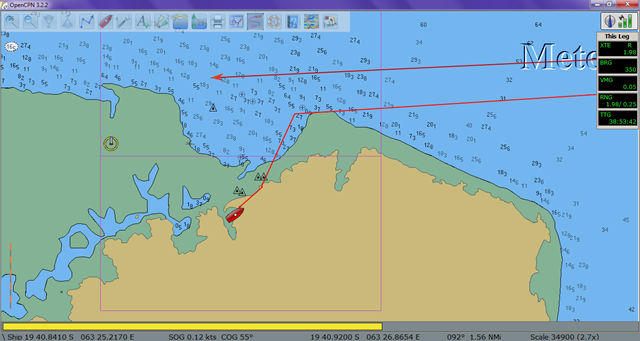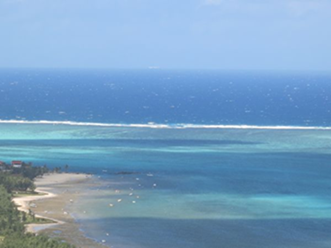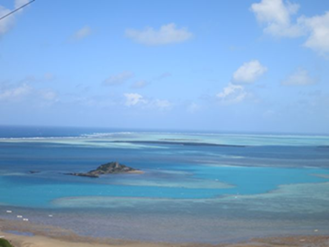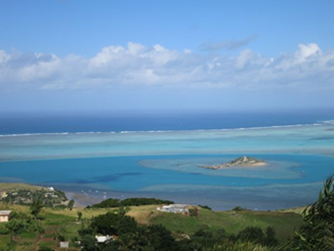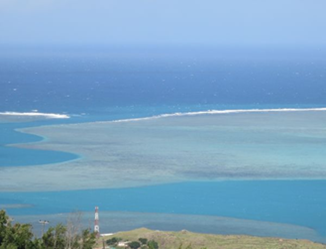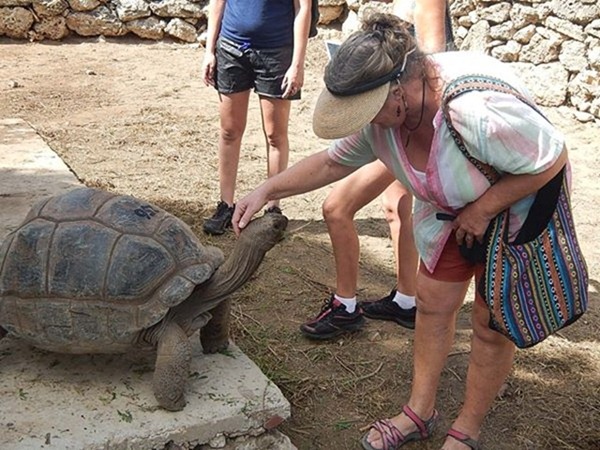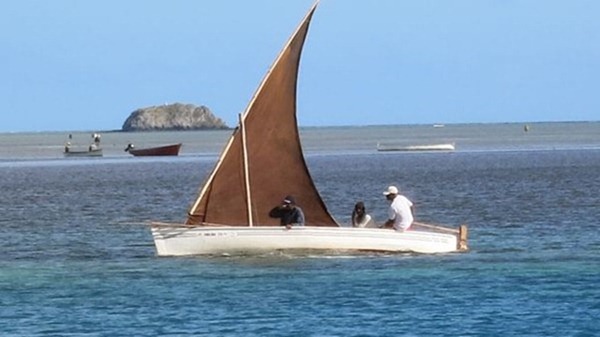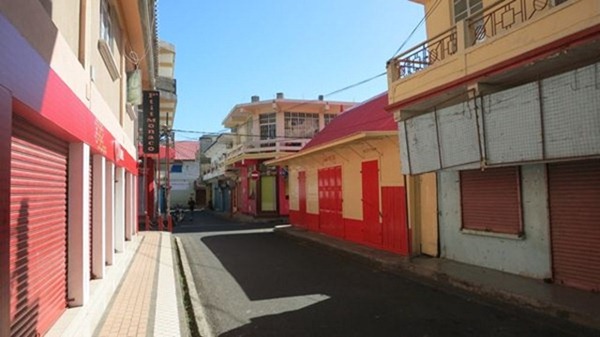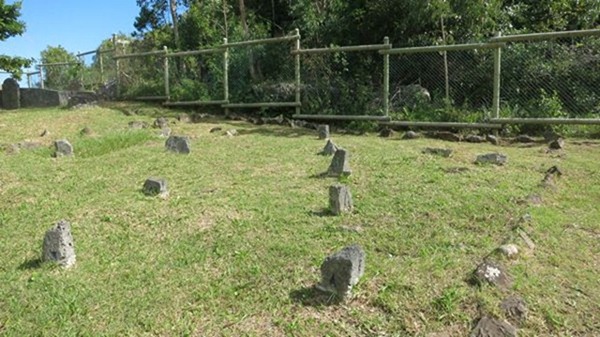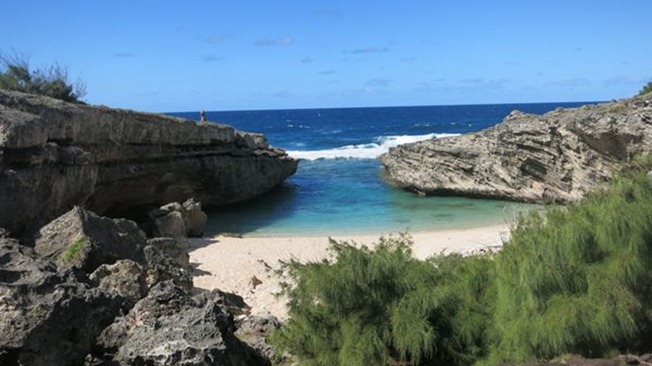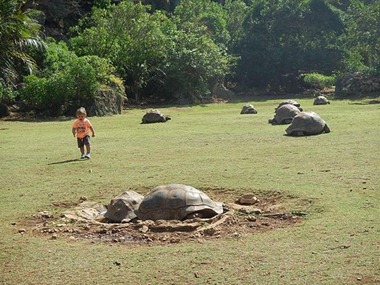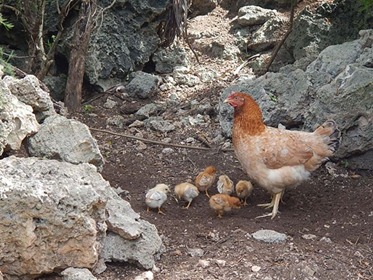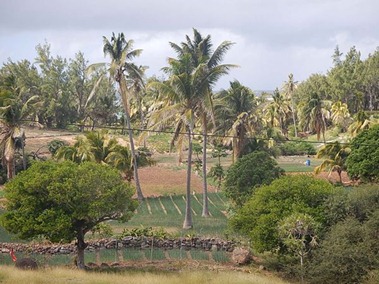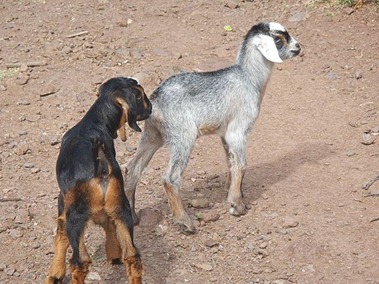Discovering Rodrigues

|
A small volcanic island about 650 km north east of
Mauritius.
Here is Gryphon II moored up just after we entered the harbour. The grey areas are reef, the whole island is extensively reef-bound with much shallow water surrounding and meandering through.
The effect is to create a coastline surrounded by a beautiful turquoise lagoon with numerous small entrances through the reef and flecked with tiny islands all of which changes colour as the sun moves across the sky:
The island has plenty of villages but the landscape is lightly touched. There is little impact from the limited tourism and the Rodriguans are very environmentally aware having an ecology that was plundered by visiting ships who caused the extinction of the Solitaire, Rodrigues’ equivalent of the dodo, and the two species of giant tortoise which were loaded on to ships a hundred at a time as a living larder that needed little attention. There is now a tortoise sanctuary where these friendly creatures are being reintroduced from Mauritius.
The soil is rich and agriculture in the higher damper parts of the island appears to be very rewarding. The market shows off the varied and abundant produce; very little is imported, we saw apples and grapes from South Africa but not much else. Fruits here, often growing wild, include mangoes, pomegranate, guava, pawpaw, passion fruit, oranges, lemons, limes, coconuts and breadfruit. The main crops for export are maize and red kidney beans but everything else is grown including beets, french beans, salad crops, tomatoes and cucumbers, potatoes and a whole variety of other root and leafy vegetables. Livestock includes sheep, goats, cattle, pigs and poultry; the majority of the cattle have the large hump at the shoulder and the distinctive head shape with drooping ears like African cattle but there are others with auburn hides which would look quite at home in the English countryside. All these creatures look very healthy and the young are left with the mothers looking contented in this pastoral idyll.
The sea provides plenty of fish and the island’s cuisine is renowned for dishes using raw (ceviche) and cooked fish, squid, octopus, crab and conocono which is a spiral shell fish about 6-8 inches long said to have aphrodisiac properties. Perhaps not good for the conocono as plenty of empty shells can be found around the island. Not much else is thrown down, there is very little litter, virtually none in the towns. The Regional Authority has banned plastic bags; instead natural raw materials such as pandanus and cotton for making baskets, bags, hats and other products are utilised. This is the cleanest place we have visited for a very long time and very refreshing after litter strewn Malaysia and Indonesia.
The climate is also delightful.The temperature during the day climbs to the high 20s but there is a constant breeze and the humidity is lower than Asia. It is currently winter here and at night the temperature drops to 17 or 18C …low enough for us to need a duvet at night. Local mums dress their small children up in woolly hats to beat off the rigours of these harsh winters! People are friendly and helpful. English is the official language but French is much preferred and Creole is dominant. The island was first populated by slaves who escaped from Mauritius. The English freed Mauritian slaves and came to Rodrigues to do the same for the Rodriguans but they thought the soldiers were arriving to take them back and started fighting, in the end when they realised they were lost some committed suicide rather than return to slavery. At the slave memorial there are a few traditional type graves but also a group of 14 from the time of the incident, they are unnamed but have simple rune like markings carved into the stones.
Despite being a small island the landscape is very varied and we have found ourselves saying, “Oh this is very Mediterranean………………this is very like Ireland………………………….the Greek islands……………….parts of Cornwall”, etc. There is such a wealth of fruit, flowers, trees, shrubs which change as the landscape changes and fringed with Rodrigues lovely coastal paths, headlands and beaches. Take a hike and all will change within an hour or so.
We made two very special friends whilst we were here whom we hope to see in Mauritius as well and possibly England too. A special thank you to Tim and Liz who acted as enthusiastic guides whilst we were here, were generous hosts and perfect ambassadors for Rodrigues. Tim is English but Liz was born here in Rodrigues; they are now setting up home here and will have 2 apartments to rent should anyone want to come here….you could not be disappointed! Don’t sail or fly off to the Maldives – come here.
|
